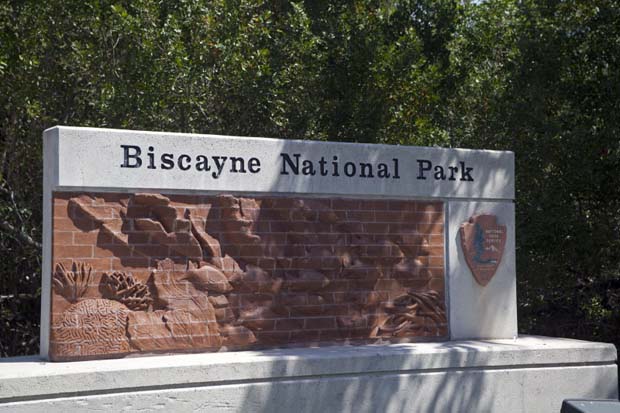Keep America Fishing Calls for Angler Rejection of Biscayne National Park No-Fishing Zones
[dropcap]D[/dropcap]espite strong opposition from the recreational fishing community and the Florida Fish and Wildlife Conservation Commission, the National Park Service continues to breathe life into an unacceptable plan to create a large no-fishing zone in Biscayne National Park in which you, your family and friends would no longer be able to access these public waters.
Promoted by environmental groups who don’t want to see you out on the water enjoying Florida’s sustainably-managed fisheries, the National Park Service is still considering a management plan option – Alternative 4 – that would close roughly 10,500 acres of the Park’s most popular and productive shallow water reefs to recreational fishing.
What’s at Stake? Not only would this marine reserve have unacceptable negative impacts on the communities that are dependent on reasonable recreational fishing access to Biscayne National Park, but it would also set a terrible precedent by locking the public out of public waters without any clear justification.
The National Park Service is holding a final round of public input before selecting a final plan, which means anglers like you need to speak out NOW, or our fishing access could be lost forever.
Please attend one of the following identical listening sessions and speak out against the marine reserve plan. Click here for suggested talking points.
- Monday, September 22
6:00 p.m. to 9:00 p.m.
Pioneer Florida Museum
826 South Krome Avenue
Florida City, FL 33034
- Tuesday, September 23
6:00 p.m. to 9:00 p.m.
Newman Alumni Center
University of Miami, 6200 San Amaro Drive
Coral Gables, FL 33146
- Wednesday, September 24
6:00 p.m. to 9:00 p.m.
Holiday Inn Key Largo
99701 Overseas Highway
Key Largo, FL 33037
If you cannot attend one of the in-person meetings listed above, you can send in your comments electronically . . .
The marine reserve proposal has been opposed by recreational fishermen ever since it was first proposed in the early 2000s. Unfortunately, all the hard work that has gone into the development of other, less restrictive management measures could be for nothing if the National Park Service moves forward with Alternative 4.
About Keep America Fishing:
KeepAmericaFishing™ is leading the fight to preserve your right to sustainably fish on our nation’s waterways. As the voice of the American angler, KeepAmericaFishing works to keep our public resources – our oceans, lakes, rivers and streams – open, clean and abundant with fish.



Comments on the BNP Management Plan meeting on September 23, 2014:
In 1846, South Carolinian William Elloitt observed that: “What a wonder, then, that men, forgetful of the future, surrendering themselves to the present, mingle with the throng of destructives who seem bent on extermination of the game, rather than attempt the difficult, and unpopular, and thankless office of conservation!” This task is still thankless in our generation!
Many critics bemoan the steady increase in laws and regulations on their outdoor activities and initially blame the regulators. While the true causes of the decline in the fisheries is the general degradation of the environment due to factors such as the large increase in human populations, uncontrolled development with the resulting habitat losses.
The well documented dwindling fish sizes and stocks are a direct result of more people, usage and development. The “do nothing” alternatives and existing resource management policies will not work.
Any usage allowed in BNP should be balanced with marine reserves and zones that restrict fishing in order to preserve intact pieces of the existing ecosystems. Establishment of fully protected marine habitats and multi-use reserves is a good management tool that is currently available to combat the exploitation of these dwindling ecosystems.
The health and resistance of coral reefs, is strongly dependent on the presence of a functionally complete ecosystem, this includes large plant eating and predatory fish. Therefore controlling overfishing can, increase the biodiversity needed for the reefs to survive in particular locations. Studies show that fish biomass is significantly larger in well-enforced no-take marine reserves, but there were no significant differences between multi-use marine protected areas (which allow some fishing) and open access areas at the regional scale. Establishment of marine protected areas, including fully protected marine reserves, is one of the few management tools available for local communities to combat the deleterious effect of large scale environmental impacts, including global climate change, on ocean ecosystems.
Meanwhile, governmental agencies, conservationist and sport-fishermen are specific high-profile groups that can be focused on and attacked by short-sighted economic and political interests.
The concept of local politics trying to retain some control and authority in federal areas is contrary to the basic themes that our national parks were founded on. There are separate regulatory zones in BNP that fall under the authority of the state and/or park, this is confusing and these overlapping regulatory areas should be consolidated. The scope of the management goals of the state and federal authorities are very different. In other national parks fisheries rules and laws are mostly regulated and enforced by the parks.
Over the last several years I have personally gone to most of the stakeholder meetings for these fisheries management plans, Biscayne National Park is trying to do their best to manage and restrict areas that have the least effect on sport and commercial interests and the most beneficial effect on the overall health of our park. Alternate four is a step in the right direction, but the step is not big enough. In the long run this will become apparent.
I urge you to help BNP establish marine protection zones with no fishing allowed.